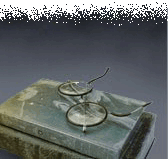|
Personal Horror
by Tim Waggoner
Janet ran, stumbling through the night, heart pounding,
lungs on fire. All she could hear was her own ragged breath
and the rustle of leaf and snap of twig as she crashed through
the underbrush. But she didn’t have to hear pounding
footfalls to know that HE was following close behind.
If only she hadn’t had sex with Billy, had listened
to her mother and stayed a virgin. If only she had remained
back at camp with the other counselors. If only she gave more
to charity, was kinder to animals, read to shut-ins --
A huge, shapeless silhouette reared up before her, sickly
yellow moonlight glinting off ax metal. Janet started to scream,
but all that came out was a hot, gurgling sound as the ax
bit deep into her throat. Again and again and again . . .
The previous scene is the sort of fiction produced by many
beginning horror writers, those who haven’t actually
read much in the genre and instead base their stories on umpty-leven
viewings of Friday the 13th and Nightmare on Elm
Street flicks. And while such films can have a visceral
(pun intended) impact, they don’t make good inspirational
fodder for fiction.
Slasher films and their ilk rely primarily on shock.
And shock is a Jaycee-sponsored Halloween Haunted House sort
of thing. It relies on visual and auditory surprise -- some
guy in a rubber mask and fright wig jumping out from a darkened
doorway hollering "Ooga-booga!" Such effects are
nearly impossible to create on the page. They have to be experienced
live and in person.
Besides, even if you could create shock effectively in written
stories, why would you want to? It’s an extremely limited
technique. The audience might gasp and jump the first time
or two you spring your Jack-the-Ripper-in-a-box on them, but
no matter how well crafted your shock machine is, readers
will soon become so desensitized to its tricks that they won’t
even be able to work up the energy to yawn.
Shock is a quick, easy scare. Empty, and to the audience,
ultimately unsatisfying. Readers want horror that does more
than go "Boo!" They want horror that disturbs them,
shakes them up, that reaches into their guts with cold bony
fingers and stirs their wet parts around. So how do you write
stories that do this? By crafting stories drawn from personal
horror.
As author and critic Douglas Winter has pointed out, horror
isn’t a genre, but rather an emotion. In order to write
effective -- and original -- horror, you have to dig into
your own psyche and find out what scares you. Worried that
no one will be frightened by the same things you are? Don’t
be. As Aristotle said, the only way to get to the universal
is through the particular. By focusing on your own personal
fears and giving them shivery life on the page, you’ll
be connecting to your audience -- guaranteed.
Begin with your childhood. Regardless of whether your wonder
years were TV movie of the week fodder or (seemingly) uneventful,
anyone who’s survived childhood has a wealth of story
material waiting to be mined.
What were you afraid of as a child? The dark; thunder and
lightning; the barking German shepherd next door; Mommy and
Daddy yelling at each other? Make a list of your childhood
bogeymen, and write at least a paragraph about each item.
Don’t think in terms of story, just write whatever comes
to mind. Try to focus on your feelings and what sparked
those feelings -- remember, horror is an emotion.
And they don’t have to be obvious fears, either. My
mother once told me that when I was a very small child, I
was afraid of feathers. What’s so scary about feathers?
Well, they have those hairy edges, and their spiny stems can
stick you. And the way they float downward so slowly, as if
they don’t want to leave the air. Where do they come
from? Mommy says they come from birds, but I’ve never
seen a bird leave any feathers in the house. What if they
come from somewhere else? Come from something else?
What if for some reason they’re coming from me?
Maybe I’ll never get a story about of this minor childhood
phobia, but if I do, it’ll certainly be original!
Next -- and this might be difficult -- make a list of any
disturbing events in your childhood. Encounters with schoolyard
bullies, severe illnesses, deaths of friends and family members.
Again, write at least a paragraph on each item.
When I was around five or six, my mother was severely burned
when taking a roast out of the oven. I remember her being
in the hospital, the doctors taking skin from her legs and
back to use for grafts. I remember the watery feeling in my
guts when later, after she’d healed, she let me touch
the brown patch of tight smooth skin on her palm. The edges
were so distinct; it seemed as if I could pinch them between
my thumb and forefinger and slowly peel away my mother’s
borrowed flesh to reveal the moist secrets which lay within.
Digging into your childhood traumas might not easy, might
even be disturbing for you. But if you want to write horror
-- real horror, not Freddy vs. Jason stuff -- then you need
to have at least a nodding acquaintance with your dark side.
Besides, writing is cheaper than therapy.
Childhood is a time when everything is new, wondrous and
terrifying. A time when we feel emotions most deeply. And
it’s those sort of intense emotions you want to summon
and use to write your horror. But you don’t have to confine
your self-exploration to the past.
Pay attention to the events in the news which upset and anger
you. Clip newspaper and magazine articles and keep them in
a folder. Don’t merely collect every article on murder
you find. Look for stories which arouse an emotional reaction
in you, stories which fascinate you.
One of the news stories I’ve collected concerns a campus-area
apartment house which has an electric chair perched on the
roof. According to the article, the current occupants had
no idea who put the chair up there and why. It was there when
they moved in. As they said, It’s always been there.
Now there’s a story waiting to happen!
Another area you can explore for ideas is the realm of dreams.
Every morning, as soon as you get up, record your dreams in
a journal. A friend of mine in college had been keeping dream
journals for years. When he first started, he only remembered
having two or three dreams a night. But after a couple years
of faithfully writing in his journal, he routinely recalled
fifteen or sixteen. And while many of them weren’t more
than snatches of everyday life replayed on the mind’s
dream-screen, he always had at least a couple that were quite
surreal and disturbing. Added up over the course of a year,
that’s a lot of potential story ideas.
A recurring dream of mine has me lost and wandering within
a building of endless rooms and hallways which seems to continually
grow and shift around me. Once I woke up from a snooze on
the couch remembering a dream I’d just had. In it, a
witch became pregnant and her familiar thought the fetus was
a tumor killing his mistress. That dream became my story "Newcomer,"
which was published in 100 Wicked Little Witch Stories.
In our dreams, our defenses and pretenses are swept aside,
and we are most ourselves. Your dreams are unique; use them
to write stories that are uniquely yours.
Another technique (one I’ve stolen from Stephen King),
is to take a look around you and let your imagination run
paranoid. Choose a minor aspect of your life or an ordinary
event and tell yourself that something is wrong with it. Seriously
wrong.
Not too far from where I live is house where the lawn is
always perfect. I mean perfect in every single way. The grass
is always the same height, the same shade of green, the edging
always neat and straight. But I’ve never seen anyone
working on the lawn. In fact, I’ve never seen anyone
enter or leave the house. The reality is that the yard probably
belongs to a retiree with a lot of time on his or her hands.
But when I look at that lawn and tell myself something is
seriously wrong with it, I start to wonder what kind of rigid,
type-A landscaping Nazi it would take to maintain a lawn like
that. And what would happen if someone decided to mess up
that yard . . .
Speaking of lawns, one summer day I was mowing mine, and
when I neared the driveway, I saw a crumpled piece of white
cloth which I knew hadn’t been there when I started mowing.
I stopped the mower, walked over, and picked up what turned
out to be a bloody sock. I live on a busy street, so I’m
used to finding all sorts of strange items that litterjerks
have tossed out their car windows. But I’d never found
anything like this before. I had a quick flash -- what if
something were seriously wrong with this sock?
What if it had been thrown out of a car by someone who was
injured, perhaps being held captive? Worse, what if it was
one of my wife’s socks? The mower made a lot of noise,
and I hadn’t been watching the front door. What if for
some reason she’d been injured and left the house without
telling me? What if she -- and our two-year-old daughter --
had been taken from the house?
I threw the sock in the garbage, and went inside to wash
my hands and, I admit it, also check on my wife and daughter.
Both of whom were fine, of course, but thanks to an inconsiderate
(and slightly wounded) motorist or passenger, I had the beginnings
of a new story.
Lastly, ask yourself what’s most important, most dear
to you. What do you treasure? Who do you love? Now ask yourself
what if these things were threatened, removed, altered, turned
against me? How would you feel? And most importantly, what
would you do about it? Your answers to these questions will
provide some of your best and most personal story ideas.
In the end, it’s simple: If you want to write truly
effective horror, don’t merely recycle the imaginings
of others. Write the stories only you can tell.
And in the process, scare the crap out of the rest of us.
|




